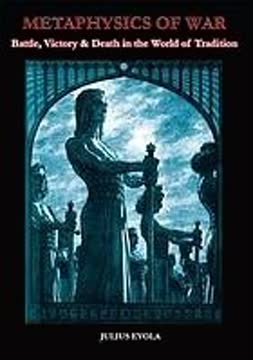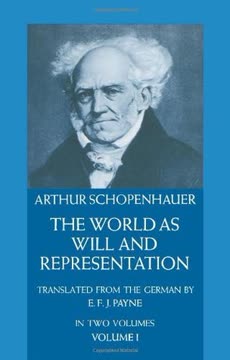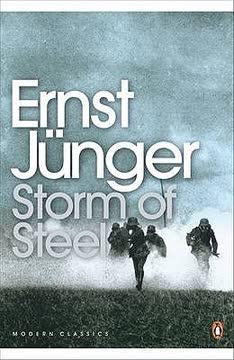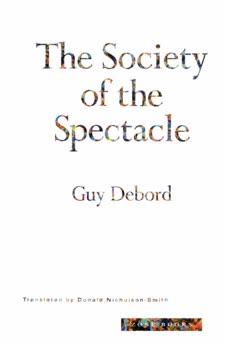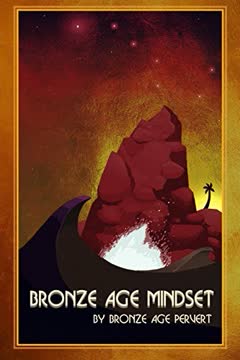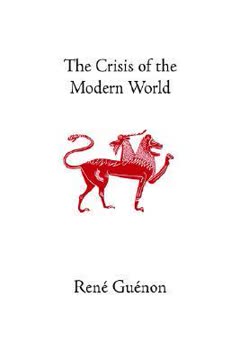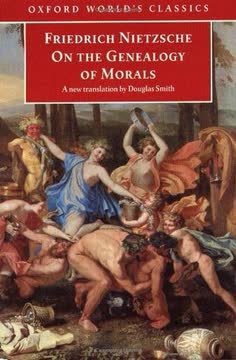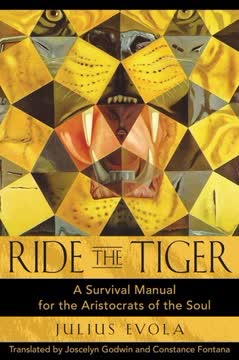Key Takeaways
1. War as a Crucible for Heroism and Spiritual Realization
War, it is said, offers man the opportunity to awaken the hero who sleeps within him.
Awakening the Hero Within. War serves as a catalyst, disrupting the mundane and offering individuals a chance to transcend ordinary existence. It provides a severe testing ground where one can discover hidden reserves of courage, resilience, and selflessness. This awakening of the "hero within" is not merely about physical bravery but also about a deeper understanding of life's relativity and the existence of values beyond material concerns.
Transfiguring Knowledge. Through the trials of war, individuals gain a profound, transformative knowledge of life, a "life according to death." This knowledge arises from confronting mortality and recognizing the impermanence of earthly existence. It fosters a spiritual perspective that diminishes the importance of trivial pursuits and elevates the significance of moments lived with purpose and valor.
Anti-Materialist Value. War, despite its destructive aspects, possesses an inherent anti-materialist value. It forces individuals to confront the limitations of physical existence and to consider the possibility of a "more-than-life." This spiritual dimension of war has been recognized across cultures and throughout history, offering a path to transcendence and self-discovery.
2. The Hierarchical Nature of Heroism: From Servitude to Transcendence
The readiness to die, to sacrifice one’s own life, may be the sole prerequisite, from the technical and collectivist point of view, but also from the point of view of what today, rather brutally, has come to be referred to as ‘cannon fodder’.
Quadripartition of Society. Traditional societies are structured around a hierarchical quadripartition, comprising slaves, the bourgeois middle class, the warrior aristocracy, and spiritual leaders. Each caste embodies a distinct "truth" and fulfills a specific function, contributing to the overall order and well-being of society. This hierarchy is not arbitrary but reflects the natural distribution of aptitudes and vocations.
Varieties of Heroism. Heroism manifests differently depending on the prevailing values of each caste. In societies dominated by spiritual leaders, war is justified by spiritual motives and offers a path to supernatural accomplishment. In warrior aristocracies, war is fought for honor and power. In bourgeois societies, war is driven by economic interests. Finally, in societies ruled by the "slaves," war becomes a tool for world revolution and the destruction of the bourgeoisie.
Spiritual Value of War. War can claim genuine spiritual value only when it serves as a means for individual spiritual accomplishment. This requires a synthesis where the individual is both a means to the war's material ends and the war is a means to the individual's spiritual growth. This synthesis is possible only when war is aligned with higher values and offers opportunities for heroic experience.
3. Sacrality of War: Connecting with Supernal Forces
According to this idea, the Roman was merely a soldier, in the most limited sense of the word, and it was by means of his merely soldierly qualities, together with a fortunate combination of circumstances, that he conquered the world.
Divine Protection. The Romans believed that divine forces created and protected the greatness of Rome, its imperium and Aeternitas. This belief permeated their entire experience, including the world of action and warrior experience. The Feciales, a special sacred college, presided over rites that provided the mystical counterpart to every war.
Augural Art. The Romans practiced augural art, which was not about discovering fates but about knowing points of juncture with invisible influences. This knowledge allowed them to develop and multiply their forces, acting on a higher plane and removing obstacles. Roman values and the "ascesis of power" had a spiritual and sacred aspect, connecting them with supernal forces.
Triumphal Ceremony. The ceremony of the triumph in Rome was more religious than militaristic. The victor donned the insignia of the supreme God of the Capitol, placing triumphal laurels in the God's hands, acknowledging the divine as the true victor. This ceremony and the origins of imperial apotheosis suggest that Romans attributed victory to a transcendent force manifesting through their leaders.
4. The Crusades: A Means for Heroic Ascesis
Most of the knights who gave their energies and their blood for the ‘holy war’ had only the vaguest ideas and the sketchiest theological knowledge regarding the doctrine for which they fought.
Heroic Spirit. The Crusades, often viewed through economic, ethnic, or superstitious lenses, were fundamentally a means for the heroic spirit to manifest and realize a form of ascesis. The Christian faith and the religious struggle against the "infidel" served as a vehicle for knights to affirm themselves and pursue spiritual growth. Many knights had limited theological knowledge but were driven by a deeper, transcendent purpose.
Transcendent Myths. The Crusades were associated with ancient sagas of a sacred city in the distant East where death does not exist. The struggle against Islam had the significance of an ascetic test, a fight for the Kingdom of Heaven. Those who died in the Crusades were symbolically compared to gold refined in fire, opening the way to the supreme Lord.
Supranational Community. Knightly orders like the Templars and Knights of Saint John comprised warriors weary of the world, ready for absolute action free from temporal interests. They formed a supranational community, answering the call to "sacred war" for a "celestial fief." The Crusades led to a purification and internalization of the spirit, recognizing something superior to both victory and defeat, and according the highest importance to heroic action accomplished independently of material fruits.
5. Greater vs. Lesser War: The Internal Jihad
‘I return now from the lesser to the greater war.’
Distinction Between Wars. The Islamic tradition distinguishes between the "lesser war" (exoteric, material battle) and the "greater war" (interior, intangible struggle). The "greater war" is fought against the enemy within, including cravings, passions, weaknesses, and cowardice. Vanquishing this inner enemy is essential for inner liberation and participation in what is beyond life and death.
Synthesis of Wars. Heroic traditions prescribe the "lesser war" as an instrument in realizing the "greater war," ultimately merging both into one. In Islam, "holy war" (jihad) and "the path of God" are interchangeable terms. The blood of heroes is considered closer to the Lord than the ink of scholars.
Inner Orientation. The decisive point is one's inner orientation and persistence in what is spiritual during the double struggle. This prevents a blind transformation into a wild animal and ensures mastery over oneself. The warrior is accompanied by an impassive divine being, symbolizing the duality of principles maintained within.
6. The Metaphysics of War: Divine Force and Destruction
‘With the exception of you, all the soldiers here on both sides will be slain. Therefore get up. Prepare to fight and win glory. Conquer your enemies and enjoy a flourishing kingdom. They are already put to death by My arrangement, and you, [O Arjuna], can be but an instrument in the fight. ... Therefore, kill them and do not be disturbed. Simply fight, and you will vanquish your enemies in battle’
Bhagavad-Gita. The Bhagavad-Gita presents a metaphysical vision of war through a conversation between Arjuna and Krishna. Pity and humanitarian scruples are seen as "impurities," and the warrior is urged to fight with determination. The text outlines the "inner war" against lust and passion, emphasizing the need for lucid, supra-conscious heroism.
Metaphysical Unreality. The text distinguishes between the incorruptible spirit and the illusory human element. Consciousness of the metaphysical unreality of mortal life is associated with the idea that spirit appears as a destructive force towards limitation. The warrior evokes the spirit by becoming an instrument of destruction and death.
Divine Force. God declares, "I am the strength of the strong, devoid of passion and desire." He reveals himself to Arjuna in a transcendent and fearful form. Human beings fall because a power burns within them that transcends their finitude. The warrior who does not fear death assumes the powers of death, passing beyond limitation and manifesting what is beyond life.
7. Army as a Vision of the World: Ethical and Social Solidarity
It is a matter of conceiving the being here below as having been sent in the guise of a man on a mission of military service to a remote front, the purpose of this mission not always being directly sensed by the individual.
Military Service. Life should be conceived as a mission of military service, with inner nobility measured by resistance and accomplishment. This view fosters an affirmative attitude towards the world, coupled with a certain freedom. The feeling that this world is not one's true home enables one to minimize the importance of earthly concerns and confers calm force and breadth of vision.
Social Solidarity. The military conception of life leads to a new sense of social and political solidarity, transcending humanitarianism and socialism. Society is conceived as a union of distinct beings, united in common action without sentimentalism. Fidelity and sincerity are the basis of every community, with solidarity limited by dignity and affinity.
Stoicism. The military vision of life is valuable for inner strengthening, fostering a Roman ethic. Reactions to life's experiences become positive and constructive. Seneca affirms the true man as superior to a god, challenging misfortune and showing superiority. Dark moments are seen as hidden providentiality or appeals to nobility.
8. Race and War: Inner Awakening Through Combat
That pacifism and humanitarianism are phenomena closely linked to internationalism, democracy, cosmopolitanism and liberalism is perfectly logical – the same anti-racial instinct present in some is reflected and confirmed in the others.
Biological and Meta-Biological Race. Cross-breeding is not the only cause of racial decline; inner extinction can also occur. A purely biological conception of race must be integrated with a "racism of the second and third degree," considering race in the soul and spirit. This deep, meta-biological force conditions physical and psychical structures.
Passive Defense and Active Resistance. Racism involves passive defense, sheltering the race from external actions, and active resistance, minimizing the predisposition to degeneration. Active resistance involves exalting the inner race and ensuring its intimate tension is never lacking. An obstacle or test is necessary to reawaken latent tension.
Combat as Inner Awakening. Combat and war are the highest instruments of inner awakening. Pacifism and humanitarianism are linked to anti-racial instincts. War serves as a "total test" of surviving racial forces, with some collapsing and others awakening. Catastrophes can be the price of heroic peaks and new liberations of primordial forces.
9. Two Heroisms: Naturalistic vs. Spiritual
War, experienced, determines a first selection; it separates the strong from the weak, the heroes from the cowards.
Races of Nature vs. Super-Races. Some races are like animals, driven by instinct and collectivism. Others are vehicles for a superior, super-biological element, embodied in tradition and its elite. Purity of blood is insufficient; "divine" blood defines the superior race.
The Test of Fire. War acts as a catharsis, stripping away superficialities and exposing the essence. It imposes a fundamental alternative, forcing individuals to confront reality and life and death. This test can lead to two outcomes: a shift to the sub-human or a shift to the superhuman.
Sub-Human vs. Superhuman. Erich Maria Remarque's work reflects the shift to the sub-human, where war is an elemental, impersonal force, and survival depends on reawakening instincts. René Quinton's work reflects a biological view of war, where man is reduced to a "male" driven by species instincts. The other possibility is the restoration of the race of the spirit, where heroic experience transfigures action and leads to a more-than-life state.
10. The Aryan Doctrine: Combat as a Path to Victory
The text works on the fundamental distinction between what in man exists in the supreme sense and, as such, is incorruptible and immutable – spirit – and the corporeal and human element, which has only an illusory existence.
Metaphysical Justification. The Aryan doctrine of combat views war as a perpetual fight between metaphysical powers. The Olympian principle of light opposes the dark forces of chaos. This conception transforms war into the "path of God" and "greater holy war."
Nordic-Aryan Tradition. Valhalla is reserved for heroes fallen on the battlefield. Odin's self-sacrifice showed the path to the divine sojourn. The forces of fallen heroes assist in fighting the Ragna-rökkr, the "darkening of the divine."
Asceticism of Action. The Muslim tradition distinguishes between the "lesser jihad" (material war) and the "greater jihad" (spiritual war). The "lesser war" is a path to achieving the "greater jihad," with action attaining the value of inner overcoming. The Bhagavad-Gita teaches that one should fight without considering happiness or distress, loss or gain, victory or defeat.
11. The Warrior Element for the New Europe: Restoring Traditional Values
The current battle is not so much against a particular people but rather against a particular idea, which is more or less the same as the one supported by the Allies in the previous war.
State vs. Military Element. The First World War highlighted the opposition between the state and the military element. One view subordinates the military to the civilian bourgeoisie, while the other integrates the military into the political and ethical order. The latter view, represented by the Central Powers, emphasizes warrior ethics and limits the bourgeois spirit.
Restorative War. The current war is a restorative war, aiming to end "democratic imperialism" and restore traditional values. It seeks to create a new age where warrior ethics serve as the basis for European civilization. This involves a reversal of values and a return to the ideals of the Aryan peoples.
Warrior Spirit. The warrior spirit involves inner discipline, superiority, and a calm, controlled formation of the inner being. It emphasizes love for distance and order, subordination to principles, and a feeling of dignity devoid of vanity. This spirit can organize forces into a new unity and foster direct, clear, and loyal relations based on fidelity and honor.
12. Varieties of Heroism: From Sub-Personal to Supra-Personal
For them the combatants are nothing but ‘human material’ in the most brutal sense of this sinister expression.
Bolshevik Sub-Personhood. Soviet Russia's conduct of war disregards human life, viewing combatants as "human material." This reflects Bolshevik thought, which destroys personal values and reduces individuals to mechanical members of a collective. This leads to a "telluric heroism" under the sign of the collective.
Japanese Mysticism of Combat. Japanese airmen and soldiers display a "supra-personal" heroism rooted in Buddhist and Zen principles. They deny the reality of the "I" and embrace a transcendental plane, casting away earthly life with the certainty of eternal existence. This heroism is "Olympian," free from tragedy and tied to a meaning beyond life.
Roman Devotio. Ancient Roman traditions contained motifs of disinterested, heroic offering in the name of the state. The devotio involved a warrior sacrificing himself to facilitate victory, invoking gods and unleashing forces. This reflects a mysticism aware of heroism and sacrifice, binding the feeling of a supernatural reality to the will to struggle.
Last updated:
FAQ
What is "Metaphysics of War" by Julius Evola about?
- Exploration of War's Spiritual Dimension: The book examines war not just as a physical or political phenomenon, but as a path to spiritual realization and transcendence, rooted in the traditions of ancient and medieval societies.
- Tradition vs. Modernity: Evola contrasts the traditional, hierarchical, and spiritual understanding of war with the materialistic, democratic, and collectivist views of the modern world.
- Comparative Analysis: The text draws on examples from Roman, Nordic, Christian, Islamic, and Hindu traditions to illustrate how different civilizations have understood the metaphysical significance of battle, heroism, and death.
- Critique of Modern Attitudes: Evola criticizes pacifism, humanitarianism, and the reduction of war to mere politics or economics, arguing that these perspectives ignore the deeper, transformative potential of conflict.
Why should I read "Metaphysics of War" by Julius Evola?
- Unique Perspective on War: The book offers a rare philosophical and spiritual analysis of war, challenging conventional, materialist interpretations.
- Insight into Traditionalism: Readers interested in traditionalist thought, the critique of modernity, or the spiritual dimension of history will find Evola’s approach thought-provoking.
- Historical and Cross-Cultural Depth: Evola draws from a wide range of sources—Roman, Aryan, Islamic, and more—providing a comparative study of heroism and combat.
- Relevance to Modern Crises: The book addresses the decline of heroism and the challenges of modernity, offering perspectives that some may find relevant to contemporary cultural and existential questions.
What are the key takeaways from "Metaphysics of War" by Julius Evola?
- War as Spiritual Path: In traditional societies, war was seen as a means of spiritual ascent, not merely as violence or politics.
- Hierarchy of Heroism: Evola distinguishes between different types of heroism, from sub-personal, collective sacrifice to supra-personal, transcendent self-overcoming.
- Critique of Modern Decline: The loss of spiritual meaning in war reflects the broader decline of traditional values and the rise of materialism and egalitarianism.
- Universal Patterns: Despite cultural differences, many civilizations share a core understanding of the metaphysical significance of battle, victory, and death.
How does Julius Evola define "heroism" in "Metaphysics of War"?
- Multiple Forms of Heroism: Evola identifies a hierarchy of heroism, from instinctual, collective sacrifice (as seen in mass armies) to conscious, spiritual heroism aimed at transcendence.
- Heroism as Self-Overcoming: True heroism involves overcoming the fear of death and the limitations of the individual self, aligning with a higher, supra-personal principle.
- Distinction from Modern Notions: Evola contrasts traditional heroism with modern, materialist, or collectivist forms, which he sees as degenerate or sub-personal.
- Role in Social Order: Heroism, in its highest form, is linked to the maintenance of a hierarchical, spiritually-oriented society.
What is the "metaphysics of war" according to Julius Evola?
- War as Spiritual Test: Evola sees war as a metaphysical ordeal that can lead to spiritual awakening or liberation, not just a physical or political event.
- Dual Nature of Combat: He distinguishes between the "lesser war" (external, physical combat) and the "greater war" (internal, spiritual struggle against one’s own lower nature).
- Transcendence Through Action: The act of fighting, when done with the right inner orientation, becomes a means of transcending individuality and achieving a higher state of being.
- Tradition as Foundation: This metaphysical understanding is rooted in the doctrines and rituals of traditional civilizations, such as the Aryan, Roman, and Hindu worlds.
How does "Metaphysics of War" by Julius Evola compare different cultural traditions on war and heroism?
- Roman Tradition: War is seen as sacred, with rituals and beliefs that link victory to divine favor and the possibility of immortality for the hero.
- Nordic and Aryan Traditions: Concepts like Valhalla and the "triumphal death" (mors triumphalis) emphasize the spiritual rewards for warriors who die heroically.
- Christian and Islamic Traditions: Evola discusses the Crusades and jihad, highlighting the idea of "holy war" as both an external and internal struggle.
- Hindu Tradition: The Bhagavad-Gita is cited as a key text, presenting battle as a path to spiritual realization when fought with detachment and right intention.
What is the significance of the "greater war" and "lesser war" in Evola's philosophy?
- Lesser War: Refers to physical, external combat against enemies, typical of conventional warfare.
- Greater War: Represents the internal, spiritual battle against one’s own passions, weaknesses, and lower instincts.
- Integration of Both: Evola argues that the true warrior unites both wars, using external conflict as a means to achieve inner transformation.
- Universal Principle: This duality is found in various traditions, especially in Islamic and Hindu teachings, and is central to Evola’s metaphysical justification of war.
How does Julius Evola critique modernity and its approach to war in "Metaphysics of War"?
- Materialism and Egalitarianism: Evola criticizes the modern reduction of war to economics, politics, or mass mobilization, devoid of spiritual meaning.
- Loss of Hierarchy: He laments the decline of traditional, hierarchical societies in favor of bourgeois, democratic, and collectivist systems.
- Dehumanization of Combat: Modern war, in Evola’s view, turns individuals into "human material" or "cannon fodder," stripping away the possibility of heroic transcendence.
- Call for Inner Renewal: He suggests that only by restoring the spiritual dimension of war can societies and individuals recover true meaning and order.
What role does the concept of "race" play in "Metaphysics of War" by Julius Evola?
- Beyond Biology: Evola distinguishes between biological race and "race of the spirit," emphasizing inner qualities over mere genetics.
- Race and Heroism: He argues that the capacity for true heroism and spiritual awakening is linked to the presence of a "super-race" or spiritual elite within a people.
- Degeneration and Renewal: Racial decline, for Evola, is as much a spiritual and moral process as a biological one, and war can serve as a test or catalyst for racial renewal.
- Controversial Views: Evola’s ideas on race are complex and have been criticized for their association with fascist and racialist ideologies.
What practical advice or methods does Julius Evola offer in "Metaphysics of War" for individuals seeking a traditional warrior path?
- Inner Preparation: Evola emphasizes the need for spiritual discipline, self-mastery, and detachment from material concerns.
- Embracing Ordeals: He encourages individuals to see challenges, risks, and even suffering as opportunities for inner growth and transcendence.
- Living According to Tradition: The book advocates aligning one’s actions and attitudes with the principles of traditional societies, such as honor, hierarchy, and service to a higher cause.
- Apoliteia: Evola introduces the concept of "apoliteia," or the apolitical stance, as a way for traditional individuals to engage with the world without being corrupted by it.
What are the best quotes from "Metaphysics of War" by Julius Evola and what do they mean?
- "War offers man the opportunity to awaken the hero who sleeps within him." — This encapsulates Evola’s view that war can be a catalyst for spiritual transformation.
- "There is then a synthesis, an energy and, with it, an utmost efficiency." — Refers to the union of external action and inner purpose, leading to the highest form of heroism.
- "Do thou fight for the sake of fighting, without considering happiness or distress, loss or gain, victory or defeat – and by so doing you shall never incur sin." — Quoting the Bhagavad-Gita, Evola highlights the ideal of pure, detached action.
- "The blood of Heroes is closer to the Lord than the ink of scholars and the prayers of the pious." — Emphasizes the spiritual value of heroic sacrifice over intellectual or devotional pursuits.
How does "Metaphysics of War" by Julius Evola remain relevant to contemporary readers?
- Critique of Modern Society: The book’s analysis of the loss of meaning, heroism, and hierarchy in modern life resonates with those disillusioned by contemporary culture.
- Search for Transcendence: Evola’s call for inner transformation and spiritual struggle appeals to readers seeking depth beyond material success or political activism.
- Alternative to Pacifism and Militarism: The text offers a third way, neither glorifying violence nor advocating passivity, but seeking a higher purpose in action.
- Influence on Modern Thought: Evola’s ideas continue to influence traditionalist, conservative, and even radical circles, making the book a key text for understanding certain intellectual currents today.
Review Summary
Metaphysics of War by Julius Evola is a collection of essays exploring war as a spiritual and metaphysical concept. Readers find it thought-provoking but controversial, praising its intellectual depth while criticizing its repetitiveness and outdated views on race. The book examines war through various cultural and religious lenses, emphasizing the warrior's spiritual journey. Some appreciate Evola's critique of modern society and his traditionalist perspective, while others find his ideas too esoteric or politically problematic. Overall, the book is seen as a challenging but potentially valuable read for those interested in alternative perspectives on war and spirituality.
Similar Books
Download PDF
Download EPUB
.epub digital book format is ideal for reading ebooks on phones, tablets, and e-readers.
